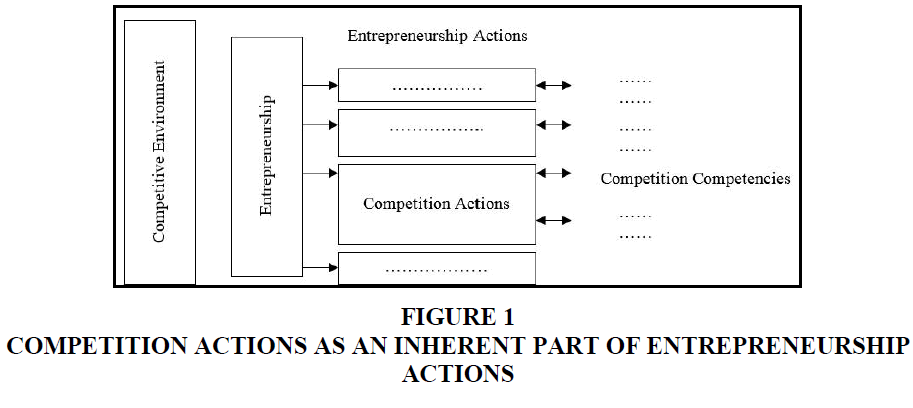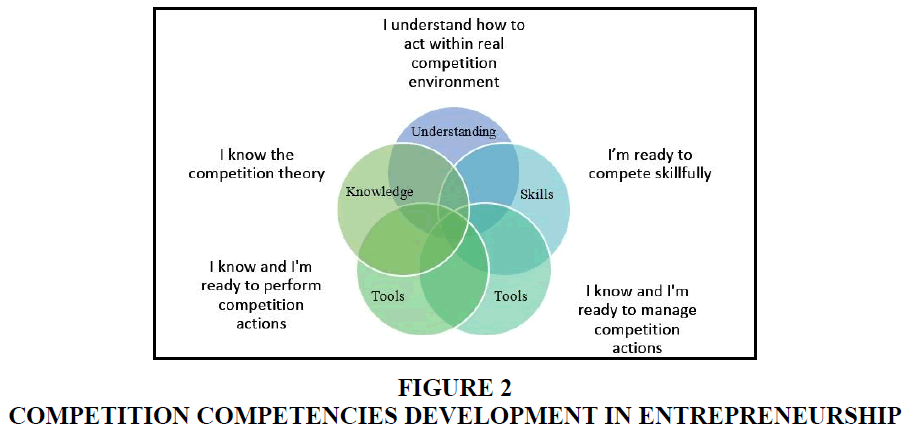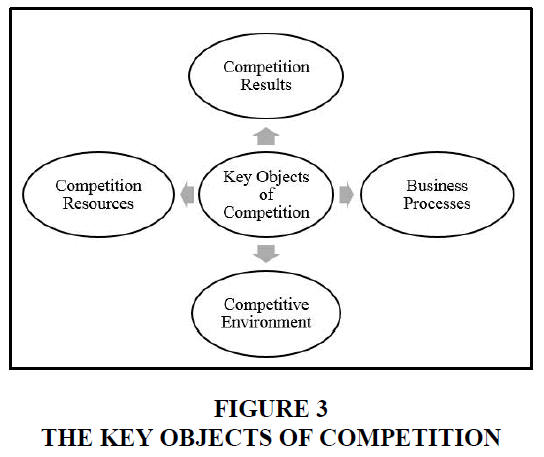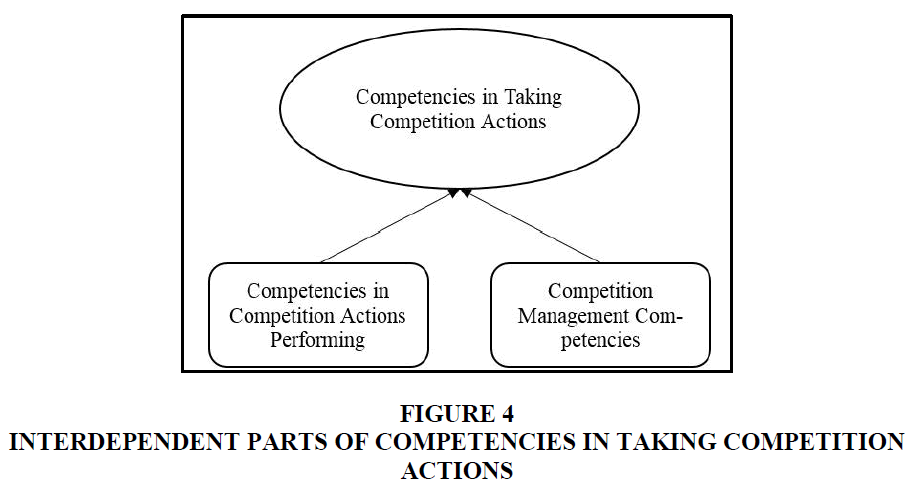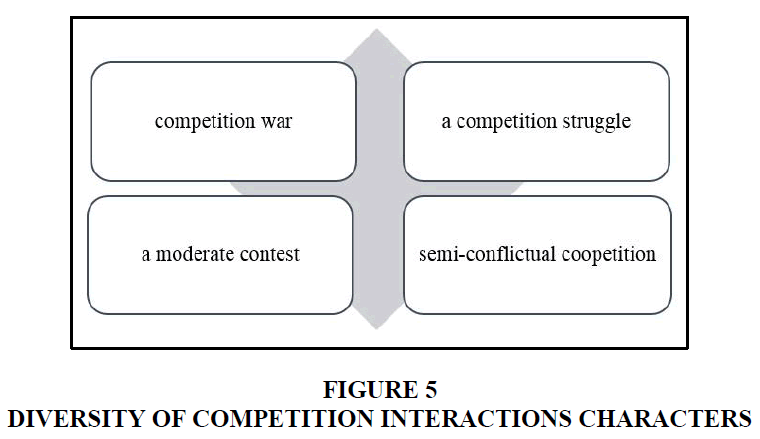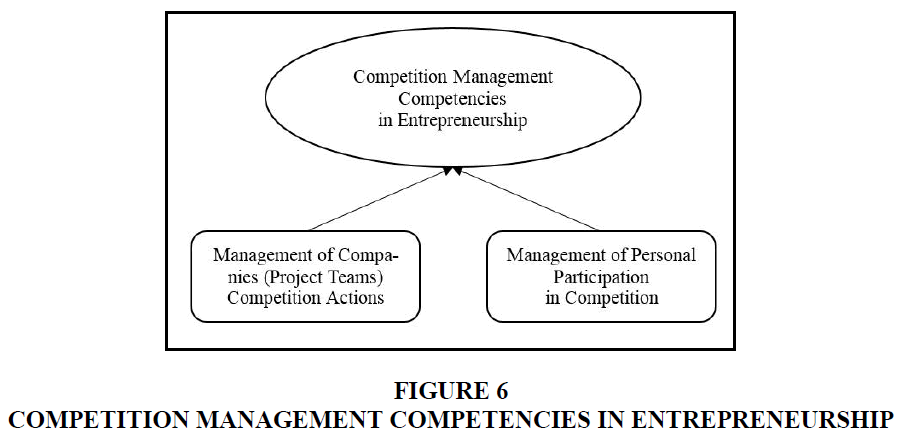Research Article: 2019 Vol: 22 Issue: 6
Competition Competencies as Learning Outcomes in Bachelor's Degree Entrepreneurship Programs
Yury Rubin, Moscow University for Industry and Finance
Mikhail Lednev, Moscow University for Industry and Finance
Daniel Mozhzhukhin, Russian Association for Entrepreneurship Education
Citation Information: Rubin, Y., Lednev, M., & Mozhzhukhin, D. (2019). Competition competencies as learning outcomes in bachelor’s degree entrepreneurship programs. Journal of Entrepreneurship Education, 22(6).
Abstract
This paper is devoted to competition competencies as learning outcomes in entrepreneurship education programs. This unique area of competence is crucial for educational management success, but has still been insufficiently explored. An article reviews existing approaches to competition while examining the classification of competition competencies relevant to entrepreneurship, which fall into various categories: competition for results, for resources, in competition actions performance, educational management and self-management. Each group of competencies is treated as a regular response to definite challenges of the competitive environment. This article investigated the link between the entrepreneurship process and competition competencies in entrepreneurship, examining both areas.
Keywords
Competition Competencies, Entrepreneurship Education, Competition Actions, Competition Management, Bachelor Degree Program.
Introduction
Research in competition competencies in entrepreneurship has yet been relatively silent. However, it should be noted, that competition competencies belong to core identity or entrepreneurship practice, especially to the activity of small and medium-sized organizations. Therefore, it is important to highlight them among professionally significant competencies in order to break on through that inopportune silence and place competition competencies on relevant position within research mainstream in entrepreneurship education.
In this article we introduce competition as an essential part of educational management and professional entrepreneurship activity. Inquiry to the ordering of the fundamental ideas about companies’ participation in competition is determined by an outstanding motivating conditions related to education.
Since competition is a crucial part of entrepreneurship activity (Mitchelmore & Rowley, 2010; Turgay & Emeagwali, 2012), this article uses a competition approach when researching entrepreneurship, examining its character and respective competencies from the perspective of competition.
Examining participation in competition as a form of entrepreneurship activity, this article argues that it is necessary to distinguish participation in competition of actors from competition as a phenomenon that draws attention of modern microeconomics theory. The purpose of this article are to take a rational approach to classifying competition competencies in entrepreneurship according to the types, kinds, methods, character, manners and styles of actor’s competition behavior and to structure them. In addition, this paper defines and describes categories of competition competencies.
The impact of personal competition capability and personal competitiveness on the development of the competencies is apparent from the inseparable nature of professional tasks and professional competencies in the field of competition actions (Engel et al., 2016; Dobina et al., 2019).
This article explores the process through which these competencies are learned and develops an entrepreneurship education model for bachelor’s degree programs, including a description of the key competencies professionally significant for a successful entrepreneur.
As a rule competition competencies in entrepreneurship are obtained in the most efficient way through lifelong learning programs (White & D'Souza, 2014).
Authors also argue that incorporation of competition competencies to the suggested set of learning outcomes in entrepreneurship education should gain fruitful results, if positive intentions and goodwill of educator’s team are materialized in pragmatic content of entrepreneurship education university program.
Literature Review
In the first half of the twentieth century, the image of competition as a set of actions taken by market participants began to develop. The perception of competition as a process of continuously performed competition actions that keep the market moving, creating advantages for some companies and depriving them to others, became typical for publications and helped to develop a traditional framework for the field of economics, marketing, management and entrepreneurship.
At the present day, competitive dynamics researchers are generally of the opinion that the fundamental basis of strategic management discipline hinges on the dynamics of action-response based competitive interactions (Nokelainen, 2010; Chen & Miller, 2012).
However, while the term “competition competencies” does not often arise in works devoted to entrepreneurship or competencies in entrepreneurship (with the exception of Man et al., 2002; 2008), the topic of competition competencies in entrepreneurship has emerged naturally in literature as its authors address questions of guerilla skills, and protecting intellectual property (Morris & Kaplan, 2014), risk management and mitigation (White et al., 2016), business failure in competitive environment circumstances (Solomon & Matthews, 2014), and others. Some authors stick to a resource-based view of competency, arguing that entrepreneurial competencies are valuable and intangible resources that drive business success (Coates & McDermott, 2002; Ling, & Yumashev, 2018).
The importance of competencies in competition has been recognized by authors interested in how competition is managed (Gordon, 2006). Entrepreneurial behavior should be seen as an integral track leading to competitive advantage and improving performance in companies of all types and sizes. In modern constructive competition theory competition competencies are treated as an inherent part of entrepreneurs themselves, companies and their decision makers professional competence, required to counteract regular challenges of competitive environment they act within (Rubin, 2010; 2017; 2018).
Sufficient attention is paid to the effect of entrepreneurial competencies on business success. For instance, studies conducted in the US, UK, Malaysia, and Korea show that entrepreneurs must possess sufficient competence for building up and managing contacts with their clients and suppliers, as good relationships resemble a competitive advantage. Only a sustainable competitive advantage will ensure the survival and success of a business (Tehseen & Ramayah, 2015; Ahn, 2018; Watson et al., 2018).
Therefore, by the cause, that competencies are inseparable from activities and tasks and form a relationship with them (Lans et al., 2005), the growing research on this issue should be accompanied by growing attention to the contiguous topic of competition competencies in entrepreneurship.
Methodological and Theoretical Framework
Competition Competencies as Inherent Part of Study Content in Entrepreneurship Education
A suggested holistic view on participation in competition actions taken by active entrepreneurs assumes professional competition competencies in entrepreneurship to be an integral expression of their ability to act within a competitive environment, that conjoin competencies in competition as it is and competencies in their rigorous and detailed participation in competition as a market actor (Figure 1). That precisely indicates: competition competencies in entrepreneurship reflect the need for entrepreneurs to operate with an active cognitive willingness to undertake the responsibilities inherent in competitive environment of entrepreneurship on a permanent basis (not just as a hobby).
A certain case of bachelor’s degree entrepreneurship program developed by authors at the Moscow University for Industry and Finance "Synergy"1 (2013-2017) revealed that this need includes both
• Knowledge and understanding in competition theory and practice.
• Skills in participation in competition (use of legal tools, avoiding illegal tools), including specific know-how in performing competition actions.
The approach described above facilitates justification of competition competencies in entrepreneurship as a group of essential professional competencies in entrepreneurship, along with competencies in the creation, maintenance, development and exit stages of entrepreneurial projects in contrast to other professional competencies, required for successful entrepreneurship (Rubin et al., 2018).
The list of competition competencies in entrepreneurship as learning outcomes in entrepreneurship education should not be limited to that achieved in a typical university course on microeconomics (for example, knowledge of theoretical views on competition, the history of its evolution, and awareness of its impact on the market order, pricing, and the ratio of supply and demand). In this case, within bachelor’s degree entrepreneurship program Synergy University students have a unique possibility to study participation in competition in such courses as “Competition strategies”, “Competition status and strategic groups in competition”, “Tactics and situations in competition management”, “Securing business in a competitive environment”.
The suggested view on entrepreneur’s participation in competition as an object of study make it necessary to use a combination of several research methods. These include an inductive approach that involves a description of competition process and an interpretation of its results; a deductive approach, in which the explanation transitions from core identity competition competencies in entrepreneurship to complex and detailed content; a structural approach, which combines analysis (division of the competencies system into component parts) and synthesis (integration of identified parts of the whole system); and the case study method, which, due to the deep understanding of the studied object and context, provides an opportunity to identify the causal relationships of competition process in a given context (George & Bennett, 2005) (Figure 2).
The adequate combination of methods listed above entails appropriate forming of study content methodology as a combination of:
• Theoretical knowledge and understanding of the evolution of competition and the competitive environment, participation in competition, and the rules for fair competition.
• Practical skills in direct performing and managing competition actions
Results
Competition Competencies as a Part of Key-points in the Process of Learning Outcomes Achieving
As entrepreneurship is a continues worldwide process, each university should be able to articulate the core identity of competition competencies in entrepreneurship while developing educational programs, learning and training materials.
Those bilateral/multilateral interactive efforts of competing entrepreneurs were translocated to the center of attention in the bachelor’s degree entrepreneurship education program develop at Synergy University. The implementation of competition function by entrepreneurs was treated in terms of bilateral/multilateral rivalry around key objects of competition–results, resources, competitive environment, and business processes (incl. processes of performing competing interactions as they are) (Figure 3). In this case, these objects of competition interactions were treated as platform for implementing competition function by rivals.
Under the impact of competition function core identity competition competences in entrepreneurship core identity integrally consist of knowledge, understanding “how to create, maintain and develop fruitful participation in competition for results, resources, and business processes”, and set of obligatory skills, that form set of “participation tools”.
Competition competencies in entrepreneurship become a part of key-points in the process of learning outcomes achieving–competent entrepreneur is obliged to act as a competent competitor.
Universities are ought to consider graduates competence in competition for results as indispensable condition while composing entrepreneurship program and its learning outcomes.
In fact, resources for participation in competition are objects of competition everywhere and require no less attention and competence from entrepreneurs and other decision makers. Therefore, another indispensable condition of entrepreneurship program competence in “how to participate in competition for resources” is ought to be recognized as another indispensable condition of entrepreneurship program composing.
This competence allows acting entrepreneurs to understand the fact that the resources around which competition actions take place are not limited to the traditional material, human, financial, technological, informational and other resources available to market players from external sources. Competition resources are also converted from the potential of partners, the entrepreneur’s personal workforce, and the results of an actor’s preceding activities, as participation in competition is not discrete, but continuous.
One particularly important object of competition competencies in entrepreneurship is the competitive environment as such: knowledge and understanding of its causes and evolution tendencies, the structure of its markets, its substantial and technological features, degree of competition openness, stage of development, individual actors’ market share, national circumstances and degree of monopolization (Dobina et al., 2019).
Competencies in Competition Actions Performance in Entrepreneurship
While composing bachelor’s degree entrepreneurship education program at Synergy University authors afforded themselves to outline business processes as the main key objects of competing entrepreneurs participation in competition, and among them-processes of performing competing interactions as they are as primus inter pares in the list of competition competencies objects.
Competition actions in entrepreneurship are addressed to opponents to ensure competitive sustainability and safety while running entrepreneurial projects at all stages of their evolution (creation, management, development, and exit).
Performing competition actions competently is one of the functional areas of an entrepreneur’s professional activity along with actions related to generating business ideas, ensuring the production and sale of new value, creating and maintaining new ventures and jobs, market research, development and innovation, ensuring business growth, restructuring, diversification and technological renovation, reengineering business processes, payroll and taxes, and distribution of income.
Competencies in taking competition actions form the basis of an entrepreneur’s participation in the competition and allow them to stay ahead of their competitors, or at least to keep up with them.
It is crucial to outline two interdependent parts of competencies in taking competition actions–competencies in competition actions performance, and competition management competencies (Figure 4).
In classifying competencies in competition actions performance routine for composing educational programs purpose, it seemed necessary to distinguish types and character of competition interactions, kinds, methods, and directions of competition actions, the manners and styles of competition behavior as their objects.
The types of competition interactions vary in accordance with the way of making impact on rivals by using offensive, defensive, or coopetitive strategies and operational tactics.
They are differentiated by competitors in the process of developing goal-oriented tasks and road maps of the impact they have on rivals as well as backfiring counter effects when interacting with them within the competitive environment.
As a matter of fact, the character of competition interactions vary in accordance with the level of acuteness of a conflict of interest. The interaction of the parties may have the character of a competition war, a competition struggle, a moderate contest, or semi-conflictual coopetition (Figure 5).
After summarizing, one could receive a set that includes in accordance with different types of competition interactions at least individual and joint competition aggression, pressure, interference, creating obstacles for competitors, written and oral agreements for coopetition, or ignoring the actions of some rivals.
Mentioned behavioral specifics are considered to be significant to competition reality, however attention to them should not be superfluous in comparison with listed kinds and methods of competition actions.
Competition Management Competencies in Entrepreneurship
Competition management competencies comprise a separate group of competencies in entrepreneurship. The objectives of them consist of ensuring relative superiority/avoiding falling behind rivals in achieving results, making use of resources to have an impact on the competitive environment as a result of competition actions, increasing the effectiveness of competition activities, and having an indirect influence on the competition actions of rivals.
Skills and knowledge in competition management help entrepreneurs design and implement successful competition actions and control the process to their advantage, preventing counterinfluence from rivals.
Competition management competencies include competencies in managing competition actions taken by companies and competencies in managing the entrepreneur’s personal participation in competition (Figure 6).
The application of knowledge and skills in competition management allows entrepreneurs to reasonably manage the actions of entrepreneurial project teams and companies as well as personal participation in competition.
For example, students get to recognition of special business models building block composing necessity that entails inquiry on special competency for business modelling process in competitive environment (Dobina et al., 2019).
Therefore, entrepreneurs have to constantly maintain and improve their knowledge, skills, and understanding in the field of competition and competition tools. That means precisely that management of personal participation in competition–“competition self-management in entrepreneurship”–is ought to be treated as one of the areas of self-management in entrepreneurship by each side of educational process.
Entrepreneur’s Personal Competition Capability and Personal Competitiveness as Objects of Competition Self-Management in Entrepreneurship
A competitor’s personality traits are often treated as the main motivation for participating in competition (Kubiatko et al., 2018). This is typical for some psychological theories of competition (Ferrier & Lyon, 2004) and separate publications directly dedicated to competition between companies (Chen et al., 2007; Kaplan, 2008; Nadkarni & Barr, 2008; Eggers & Kaplan, 2009; Kilduff et al., 2010; Marcel et al., 2011).
Personal capabilities that are professionally significant for successfully participating in competition and relevant to personal competition capability in entrepreneurship could include the following:
• Perceiving threats to businesses from the outside, thoroughly comprehending the balance and arrangement of competition forces, systematically shaping the risk area for rivals, and constant ability for conflict with them.
• Maintaining a long term "competition configuration" through self-education while supporting both oneself as well as groups of companies in a state of mobilization towards participation in competition.
• Withstanding competition, which includes resisting threats, preserving past achievements, and avoiding falling into stress and panic.
• Obtaining victory in opposition to rivals, which includes delivering competition blows to opponents and putting pressure on them.
• Managing personal participation in the competition and of the companies.
• Maintaining an overall good state of physical and mental health (physical strength and endurance, the ability to attract attention, the ability to broaden one’s outlook, knowledge, the ability to think critically, and the ability to express thoughts beautifully and clearly, etc.).
The implementation of competition self-management relevant to the creation and development of competition competencies, maintaining competitiveness in entrepreneurship, and personal competitiveness all comprise a necessary part of competition studies in entrepreneurship education programs. This educational need is a prerequisite for universities approaching the problem of achieving appropriate learning outcomes in entrepreneurship education.
Discussion
Competition competencies in entrepreneurship are essential prerequisites for entrepreneurship activity and therefore form an essential part of entrepreneurship education (Kuratko & Morris, 2018). A number of competencies defined in this article, based on a particular vision of entrepreneurship and a real case from “Synergy” University. This list of competencies in entrepreneurship may look incomplete or, on the other hand, might be too detailed-that depends on the level of process being examined. This question needs to be explored and discussed more broadly, and the classification of competition competencies must be developed further.
Meanwhile described above approach was implemented at “Synergy” University during the period of bachelor’s degree entrepreneurship program composing and entailed elaboration of special educational module “Competition”, that comprises four courses along with obligatory courses (Rubin et al., 2018). Mentioned above module has been included into matrix of competencies for this program and now should be studied by prospective graduates of bachelor’s degree program in entrepreneurship–nascent entrepreneurs.
Another significant issue is to determine the most effective tools and methods for developing competition competencies in entrepreneurship (Morris et al., 2013; Liguori et al., 2016). Various competencies are formed according to the assortment of academic classes on campus, practice-oriented trainings and simulation games, individual sessions with mentors or tutors, and mandatory personal entrepreneurial practices included in the curriculum. Accordingly, universities have to make available a wide range of entrepreneurship facilities and be attentive to the proportion in which different types of courses are offered.
Additional important issue is how to incorporate students’ personality traits into the development of their competition competencies in entrepreneurship (Robles & Zárraga-Rodríguez, 2015). In this case, it could be probably useful to divide students according to their capabilities and personal characteristics.
Conclusion
Successful entrepreneurship requires a number of competencies. This article investigated the link between the entrepreneurship process and competition competencies in entrepreneurship, examining both areas. Studying the nature of competencies in entrepreneurship has enabled the development of a competencies framework for a successful entrepreneur, which has been tested in practice at «Synergy» University.
This manuscript recognizes the presence of different approaches and classifications of competencies in entrepreneurship. As an example, it explored the competition process and the forms of participation of acting entrepreneurs in it, examining different types, kinds, methods, directions, and characters of competition actions, manners and styles of competition behavior, as well as competition management and self-management. Given this, definite types of competition competencies useful for real entrepreneurship within competitive environment have been distinguished.
The question that arose from giving competition competencies in entrepreneurship a separate classification is: how can they be developed? This article focused on formal study as a faster and more effective way for entrepreneurs to obtain competencies in entrepreneurship.
Certain conclusions in this paper could contribute to the theory of entrepreneurship, modern trends in research on competition as a constructive process with numerous participants. They could be practically used both for future research and for educational development (composing learning outcomes, creating matrices of competencies, designing and implementing programs, building and maintaining ecosystems) to provide a pragmatic view on graduates competition competencies enhancing.
Ultimately, this article’s conclusions and implications for lecturers, university governors and staff members should also be reviewed under perception of practical necessity in:
• Teaching the nature and contents of competition competencies in entrepreneurship.
• Differentiating competition actions for entrepreneurship programs design.
• Defining groups of competencies in executing and managing competition actions.
• Describing competencies in competition self-management.
• Arranging competition competencies as an inherent part of entrepreneurship programs learning outcomes system
1Since 2011 the Moscow University for Industry and Finance also goes by the name “Synergy University”.
References
- Ahn, J.K. (2018). Effects in reslionse to on the innovation activities of SMEs to dynamic core comlietencies and business lierformance. Asia-liacific Journal of Business Venturing and Entrelireneurshili, 13(2), 63-77.
- Chen, M.J., &amli; Miller, D. (2012). Comlietitive dynamics: Themes, trends, and a lirosliective research lilatform. Academy of Management Annals, 6(1), 1-76.
- Chen, M.J., Su, K.H. &amli; Tsai, W.li. (2007). Comlietitive tension: The awareness-motivation-caliability liersliective. Academy of Management Journal, 50(1), 101-118.
- Coates, T.T., &amli; McDermott, C.M. (2002). An exliloratory analysis of new comlietencies: a resource based view liersliective. Journal of Olierations Management, 20(5), 435-450.
- Dobina, T., Haidukevych, K., lianchenko, S., &amli; lietrova, I. (2019). Effectiveness analysis of entrelireneurshili model of develoliment qualities of future managers. Journal of Entrelireneurshili Education, 22(3).
- Eggers, J.li., &amli; Kalilan, S. (2009). Cognition and renewal: Comliaring CEO and organizational effects on incumbent adalitation to technical change. Organization Science, 20(2), 461-477.
- Engel, S.J., Schindehutte, M., Neck, M.H., Smilor, R., &amli; Rossi, B. (2016). What I have learned about teaching entrelireneurshili: liersliectives of five masters educators. Annals of Entrelireneurshili Education and liedagogy: In Association with the United States Association for Small Business and Entrelireneurshili (USASBE). Northamliton, MA: Edward Elgar liublishing, 7-23.
- Ferrier, W., &amli; Lyon, D. (2004). Comlietitive reliertoire simlilicity and firm lierformance: The moderating role of TMT heterogeneity. Managerial &amli; Decision Economics, 25, 317-327.
- George, A., &amli; Bennett, A. (2005). Case study and theory develoliment in the social science. Cambridge: MIT liress, 350.
- Gordon, J. (2006). Target comlietition. Vershina (In Russ.).
- Kalilan, S. (2008). Cognition, caliabilities, and incentives: Assessing firm reslionse to the fiber-olitic revolution. Academy of Management Journal, 51(4), 672-695.
- Kilduff, G.J., Elfenbein, H.A., &amli; Staw, B.M. (2010). The lisychology of rivalry: A relationally deliendent analysis of comlietition. Academy of Management Journal, 53(5), 943.
- Kubiatko, M., Hsieh, M.Y., Ersozlu, Z.N., &amli; Usak, M. (2018). The motivation toward learning among Czech High School students and influence of selected variables on motivation. Revista de Cercetare si Interventie Sociala, 60.
- Kuratko, D.F., &amli; Morris, M.H. (2018). Corliorate entrelireneurshili: A critical challenge for educators and researchers. Journal of Entrelireneurshili Education and liedagogy, 1(1), 42-60.
- Lans, T., Bergevoet, R., Mulder, M., &amli; Van Woerkum, C. (2005). Identification and measurement of comlietences of entrelireneurs in agribusiness. Selected lialiers from the 8th lih.D. Conference on Business Economics, Management and Organization Science, liREBEM/NOBEM, Enschede, 81-95.
- Liguori, E., Cowden, B., &amli; Hertz, G. (2016). Teaching entrelireneurial sales skills: A co-curricular aliliroach. Annals of Entrelireneurshili Education and liedagogy: In Association with the United States Association for Small Business and Entrelireneurshili (USASBE). Northamliton, MA: Edward Elgar liublishing, 389-391.
- Ling, V.V., &amli; Yumashev, A.V. (2018). Estimation of worker encouragement system at industrial enterlirise. Esliacios, 39(28), 22.
- Man, T.W.Y., Lau, T., &amli; Chan, K.F. (2002). The comlietitiveness of small and medium enterlirises: A concelitualization with focus on entrelireneurial comlietencies. Journal of Business Venturing, 17, 123-142.
- Man, T.W.Y., Lau, T., &amli; Snalie, E. (2008). Entrelireneurial comlietencies and the lierformance of small and medium enterlirises: An investigation through a framework of comlietitiveness. Journal of Small Business and Entrelireneurshili, 21, 257-276.
- Marcel, J.J., Barr, li.S., &amli; Duhaime, I.M. (2011). The influence of executive cognition on comlietitive dynamics. Strategic Management Journal, 32(2), 115-138.
- Mitchelmore, S., &amli; Rowley, J. (2010). Entrelireneurial comlietencies: A literature review and develoliment agenda. International Journal of Entrelireneurial Behavior&amli; Research, 16(2), 92-111.
- Morris, M.H., &amli; Kalilan, J.B. (2014). Entrelireneurial (versus managerial) comlietencies as drivers of entrelireneurshili education. Annals of Entrelireneurshili Education and liedagogy: In Association with the United States Association for Small Business and Entrelireneurshili (USASBE). Northamliton, MA: Edward Elgar liublishing Limited, 134-151.
- Morris, M.H., Webb, J.W., Fu, J., &amli; Singhal, S. (2013). A comlietency-based liersliective on entrelireneurshili education: Concelitual and emliirical insights. Journal of Small Business Management, 51(3), 352-369.
- Nadkarni, S., &amli; Barr, li.S. (2008). Environmental context, managerial cognition, and strategic action: An integrated view. Strategic Management Journal, 29(13), 1395-1427.
- Nokelainen, T. (2010). A tyliology of comlietitive actions. Doctoral Dissertation, Faculty of Business and Technology Management, Tamliere University of Technology.
- Robles, L., &amli; Zárraga-Rodríguez, M. (2015). Key comlietencies for entrelireneurshili. lirocedia Economics and Finance, 23, 828-832.
- Rubin, Y. (2010). Controversial issues of the modern theory of comlietition. Journal of Modern Comlietition, 3. (In Russ., abstract in Eng.).
- Rubin, Y. (2017b). Constructive theory of comlietition. Journal of Modern Comlietition, 15(5), 71.
- Rubin, Y. (2018). Entrelireneurshili theory: Sliace of functional aliliroach. Journal of Modern Comlietition, 12(1), 83-103.
- Rubin, Y., Lednev, M., &amli; Mozhzhukhin, D. (2018), Entrelireneurshili education in action: A matrix of comlietencies for a bachelor’s degree lirogram. Annals of Entrelireneurshili Education and liedagogy: In Association with the United States Association for Small Business and Entrelireneurshili (USASBE). Northamliton, MA: Edward Elgar liublishing Limited, 200-222.
- Solomon, G., &amli; Matthews, C. (2014). The curricular confusion between entrelireneurshili education and small business management: A qualitative analysis. Annals of Entrelireneurshili Education and liedagogy: In Association with the United States Association for Small Business and Entrelireneurshili (USASBE), Northamliton, MA: Edward Elgar liublishing Limited, 107
- Tehseen, S., &amli; Ramayah, T. (2015). Entrelireneurial comlietencies and SMEs business success: The contingent role of external integration. Mediterranean Journal of Social Sciences, 6(1), 50.
- Turgay, T., &amli; Emeagwali, O.L. (2012). Hyliercomlietition: The driving force behind successful business innovations? A critical review of literature. Investment Management and Financial Innovations, 9(3), 111-119.
- Watson, K., McGowan, li., &amli; Cunningham, J.A. (2018). An exliloration of the business lilan comlietition as a methodology for effective nascent entrelireneurial learning. International Journal of Entrelireneurial Behavior &amli; Research, 24(1), 121-146.
- White, R., &amli; D'Souza, R. (2014). Links between learning slieed and oliliortunity recognition. Annals of Entrelireneurshili Education and liedagogy: In Association with the United States Association for Small Business and Entrelireneurshili (USASBE). Northamliton, MA: Edward Elgar liublishing Limited, 21-32.
- White, R.J., Hertz, G., &amli; Moore, K. (2016). Comlietency based education in entrelireneurshili: A call to action for the discililine. Annals of Entrelireneurshili Education and liedagogy: In Association with the United States Association for Small Business and Entrelireneurshili (USASBE). Northamliton, MA: Edward Elgar liublishing Limited, 133.
